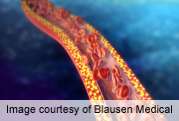In the largest single-center study of polyarteritis nodosa in childhood, fever, myalgia, and skin involvement were found to be the most common symptoms, and cumulative dose of cyclophosphamide was associated with lower risk of relapse, while gastrointestinal involvement was linked to increased relapse risk. The study has been published online June 10 in Arthritis & Rheumatism.
(HealthDay)—In the largest single-center study of polyarteritis nodosa (PAN) in childhood, fever, myalgia, and skin involvement were found to be the most common symptoms, and cumulative dose of cyclophosphamide was associated with lower risk of relapse, while gastrointestinal (GI) involvement was linked to increased relapse risk. The study has been published online June 10 in Arthritis & Rheumatism.
Despina Eleftheriou, Ph.D., from Great Ormond Street Hospital for Children National Health Service Foundation Trust in London, and colleagues retrospectively reviewed data from children with PAN seen over a 32-year period. The Pediatric Vasculitis Activity Score (PVAS) was used to assess disease activity.
The researchers identified 69 children (55 percent male) with PAN, with a median age of 8.5 years. At presentation, clinical features included fever (86 percent), myalgia (82 percent), skin involvement (88 percent), renal involvement (19 percent), severe GI involvement (10 percent), and neurological involvement (10 percent), and the PVAS was 9/63. In 40 of 50 biopsies, skin histopathology showed necrotizing vasculitis. In 94 percent of patients, selective visceral arteriography suggested PAN. Cyclophosphamide and corticosteroids (82 percent); plasma exchange (8 percent); and biologic agents (after 2002, 11 percent) were used for treatment. Thirty-four percent of patients experienced relapse and mortality was 4 percent. There was a significantly increased risk of relapse associated with GI involvement, while a significantly lower risk of relapse was associated with longer time to induce remission and increased cumulative cyclophosphamide dose.
"Childhood PAN is a severe inflammatory disease of insidious onset, and variable clinical presentation," the authors write.
More information:
Abstract
Full Text (subscription or payment may be required)
Journal information: Arthritis & Rheumatism
Health News Copyright © 2013 HealthDay. All rights reserved.





















